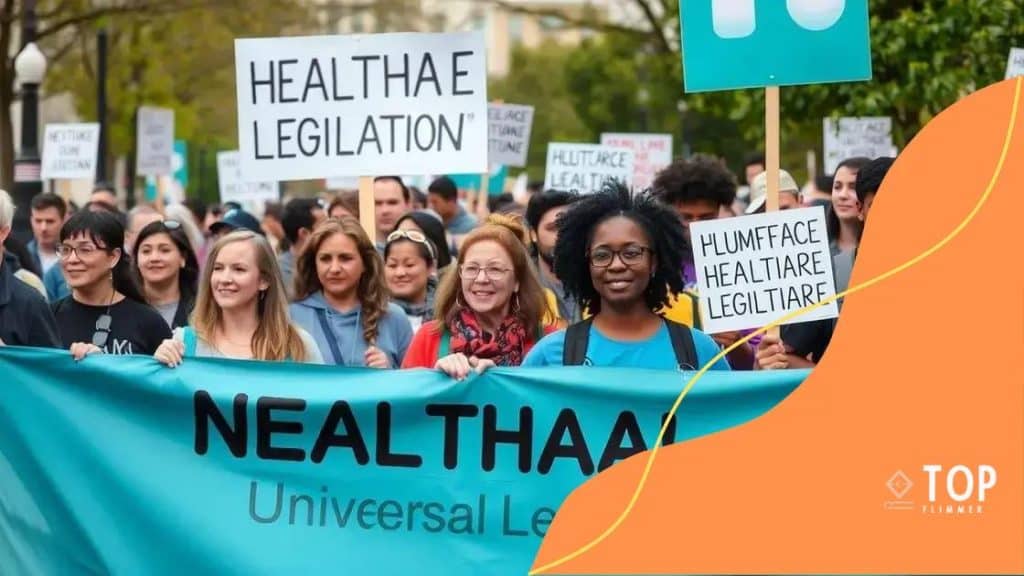Universal healthcare legislation marches: why you should care

Healthcare legislation marches are organized demonstrations advocating for universal healthcare access, highlighting issues like affordability, quality of care, and equal treatment for all individuals in society.
Universal healthcare legislation marches are becoming increasingly significant in today’s society. These events aim to draw attention to critical health policies and their implications for everyone. Have you considered how these marches might affect you?
Understanding universal healthcare legislation
Understanding universal healthcare legislation is essential for anyone who wants to grasp how health policies can affect society. These laws aim to ensure that every individual has access to necessary medical services without financial hardship.
Countries around the world have approached universal healthcare differently. For example, in some nations, healthcare is provided by the government, while others allow private options as well. This diversity leads to various systems, each with its benefits and challenges.
Key components of universal healthcare
At the heart of universal healthcare legislation are several core components that define how these systems function. These elements work together to create an inclusive healthcare environment for all citizens.
- Accessibility: Ensuring that healthcare services are available to everyone, regardless of their location.
- Affordability: Reducing financial barriers to healthcare, so people can receive the care they need without excessive costs.
- Quality of care: Establishing standards to guarantee that patients receive effective and safe medical treatments.
In addition to these fundamental aspects, universal healthcare legislation often includes provisions for preventative care. Access to regular check-ups and screenings can significantly reduce the burden of serious health issues over time.
Understanding the intricacies of universal healthcare systems can be complex. People often wonder about how these policies affect their day-to-day lives. For example, will it reduce wait times for services? How will it impact healthcare professionals? These questions highlight the need for open discussions about legislation related to healthcare.
The role of government in healthcare
Governments typically play a significant role in shaping universal healthcare policies. They are responsible for funding, regulation, and ensuring that systems operate effectively. This can vary widely from one country to another, affecting the overall success of the program.
Successful implementation requires careful planning and ongoing evaluation. Stakeholders, including politicians, healthcare providers, and patients themselves, must work collaboratively to achieve the best outcomes.
Historical context of healthcare marches
The historical context of healthcare marches reveals how advocacy for health rights has evolved over the decades. These demonstrations have become pivotal in shaping public policy, mobilizing citizens for change.
During the 1960s and 1970s, the civil rights movement inspired many groups to demand better healthcare access. Activists organized marches, urging governments to provide adequate services for all, regardless of income. These early events laid the groundwork for future healthcare advocacy.
Key milestones in healthcare marches
Several significant marches have marked the timeline of healthcare advocacy efforts. Each event highlights the ever-growing call for reform and the need for universal healthcare.
- The March on Washington for Jobs and Freedom (1963): Focused on civil rights, this march also highlighted the need for healthcare access.
- The Women’s March on Washington (2017): This event included demands for comprehensive health services, particularly concerning reproductive rights.
- The Medicare for All marches (2019-present): Demonstrators have gathered nationwide, advocating for a single-payer healthcare system.
These historic gatherings serve as powerful examples of how collective voices can influence policymakers. The passion and determination seen in these marches propel the conversation surrounding healthcare forward.
Marches often reflect broader social issues, drawing attention to economic, racial, and gender inequalities in the healthcare system. They emphasize the need for reforms to ensure that everyone can access quality medical care.
The impact of marches on legislation
Healthcare marches do not just raise awareness; they can directly impact legislation. Policymakers often take notice of large-scale demonstrations, which can lead to new proposals or reforms in existing laws. The voices of those marching represent a compelling call for action.
Public support shifts when people see the passion of their peers demanding change. This mobilizes communities and encourages discussions around vital health issues. The impact of these gatherings can be felt across the nation.
Key players behind the legislation

Understanding the key players behind the legislation for universal healthcare is essential to grasp how health policies are shaped. Various individuals and organizations contribute to the development and promotion of these laws.
Lawmakers, healthcare professionals, and advocacy groups all play significant roles. Their collective efforts push for reforms that can make healthcare accessible to everyone. Each group brings unique perspectives and expertise to the table.
Role of lawmakers
Members of Congress are crucial in creating and implementing healthcare legislation. They propose bills, debate policies, and ultimately vote on laws that impact healthcare access. Their decisions can be influenced by public opinion, lobbyists, and healthcare experts.
- Legislators often engage with constituents to understand their needs and opinions.
- Committees within Congress review proposed legislation before it is debated.
- Lobbyists advocate for specific interests, providing information and support to lawmakers.
These interactions shape the healthcare landscape, as lawmakers strive to balance competing interests and health needs.
Influence of healthcare professionals
Healthcare providers, including doctors and nurses, offer valuable insights into the functioning of the healthcare system. Their experiences highlight the challenges patients face daily. Engaging with these professionals helps legislators craft effective and relevant laws.
Organizations like the American Medical Association and various nursing associations advocate for policies that support both patients and healthcare workers. They strive for improvements in working conditions and patient care through advocacy initiatives.
Advocacy groups and their impact
Advocacy groups play a vital role in pushing for universal healthcare. These organizations bring attention to specific health issues, rallying public support for necessary reforms. They often conduct research, organize campaigns, and mobilize citizens to participate in marches and demonstrations.
- Groups like National Nurses United focus on advancing nursing practices and patient care.
- Patients for Affordable Drugs advocates for lowering medication costs.
- Healthcare-related nonprofits raise public awareness about various health issues.
Their passion helps keep the conversation around healthcare active and leads to tangible changes over time. As public support grows, lawmakers feel compelled to act.
Impacts of universal healthcare on society
The impacts of universal healthcare on society are significant and far-reaching. When a country adopts universal healthcare, it can change many aspects of daily life for its citizens. Access to healthcare becomes a right rather than a privilege, leading to healthier populations and improved well-being.
One major impact is the reduction in health disparities. Everyone, regardless of their socioeconomic status, can access necessary medical services without fear of financial ruin. This fosters a sense of equality and social justice.
Economic benefits
Universal healthcare can also positively affect the economy. Healthy individuals contribute more productively to the workforce. When people do not have to worry about medical expenses, they have more disposable income to spend on other goods and services.
- Increased workforce productivity due to fewer sick days.
- Lower overall healthcare costs in the long run.
- Growth in preventive care leads to reduced need for emergency services.
These factors can ultimately lead to a more robust economy and better job growth.
Social cohesion
Having access to healthcare can strengthen the fabric of society. Universal healthcare often leads to higher levels of public trust in government institutions. When people see that their government provides for their health needs, they are more likely to support other initiatives.
This trust can create a more engaged citizenry. People are more willing to participate in democratic processes, including voting and advocacy. When healthcare is universally accessible, it fosters community solidarity and cooperation.
Challenges to implementation
Despite its many benefits, implementing universal healthcare can face challenges. Some worry about the quality of care and waiting times for services. Others express concerns about tax increases to fund such programs. These issues need careful consideration and management.
Transforming the healthcare system requires a commitment to ongoing improvement and reform. Open dialogue among healthcare professionals, citizens, and lawmakers can help address potential problems. Ensuring that universal healthcare remains adaptable to changing needs is crucial for its continued success.
Future of healthcare legislation marches
The future of healthcare legislation marches holds immense potential as advocacy efforts evolve. These marches will continue to serve as powerful platforms for individuals to unite and voice their concerns about healthcare access and reform.
As public awareness grows, so does the impact of these marches on the political landscape. Citizens are becoming more engaged, reflecting a collective desire for meaningful change in healthcare policy.
Emerging trends in advocacy
Healthcare marches are not only about gathering to demand better policies; they are also adapting to modern communication tools. Digital platforms play a crucial role in mobilizing supporters and spreading awareness.
- Social media campaigns can amplify messages quickly, reaching diverse audiences.
- Online petitions gather support and encourage virtual participation.
- Webinars and virtual meetings allow for discussions that can culminate in physical marches.
These trends suggest a shift that makes healthcare advocacy more accessible to everyone, regardless of location.
New issues on the horizon
The future will likely see new issues surface in healthcare discussions. For instance, mental health resources and the impact of technology on healthcare delivery are becoming increasingly important. Advocates are already preparing to address these topics through future marches.
As the healthcare landscape changes, so too will the demands of activists. Issues such as telehealth, affordable prescriptions, and preventive care are gaining traction and will influence the agenda of upcoming demonstrations.
The role of youth and community engagement
Young people are becoming pivotal in shaping the future of healthcare advocacy. Their involvement brings fresh energy and new perspectives. Many youth-led movements are emerging, emphasizing the importance of addressing health inequities and environmental issues.
- Students are organizing events on campuses to raise awareness.
- Young activists use artistic expressions—like music and art—to convey powerful messages during marches.
- Community workshops are being organized to educate attendees about healthcare rights.
This involvement helps to ensure that the voices of future generations are heard in the ongoing conversation about healthcare reform.
As a result, the landscape of healthcare legislation marches is likely to become more vibrant, inclusive, and action-oriented in the years to come, reflecting society’s evolving needs and aspirations.
FAQ – Frequently Asked Questions about Healthcare Legislation Marches
What are healthcare legislation marches?
Healthcare legislation marches are organized events where individuals gather to advocate for changes in healthcare policies, emphasizing the need for universal access to care.
How do these marches influence legislation?
These marches raise public awareness, mobilize community support, and apply pressure on lawmakers to rethink and draft new healthcare policies that ensure access for all.
Who participates in healthcare marches?
Participants often include advocacy groups, healthcare professionals, patients, and community members who are passionate about healthcare reform.
What issues are usually highlighted in these marches?
Commonly highlighted issues include access to affordable healthcare, mental health resources, prescription drug pricing, and the importance of preventive care.






